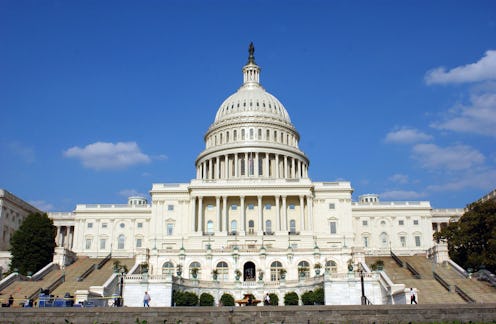News
Here’s What Would Happen If The Midterm Elections End With A Split Congress

The midterm elections are rapidly unfolding, and although nothing is for certain, pre-election polling suggests that America may potentially have a divided Congress when all of the ballots are counted. So, exactly what happens if there's a split Congress after the midterms?
For one, that would depend on exactly how Congress is split. A Democratic-controlled House paired with a Republican-controlled Senate would have different implications than the opposite outcome, in which the GOP held the House but Democrats won the Senate. That said, most polling suggests that the former is much, much more likely than the latter. So let's take a look at what might happen if Democrats win back the House, but Republicans maintain control of the Senate.
In that situation, President Donald Trump and the GOP would have a hard time enacting any major new legislation. Laws have to pass both the House and the Senate in order to land on the president's desk; while some minor and non-controversial bits of legislation (renaming post offices, for example) would probably pass both chambers, it's unlikely that a Democratic-controlled House would sign off on any major legislation favored by Trump or the GOP.
In effect, a split Congress would block Trump from implementing many of his signature policy proposals — at least domestically. Any hopes of building a wall between the United States and Mexico would almost certainly be dead in the water. It's extremely difficult to imagine a scenario in which congressional Democrats would agree to fund a project like that, especially given that congressional Republicans have already refused to do so on multiple occasions. The same goes for repealing Obamacare, enacting any more tax cuts, defunding Planned Parenthood, and, really, moving forward on any remotely controversial policy favored by the GOP.
But Trump wouldn't be blocked on all fronts, as there are plenty of things a president can do without approval from the U.S. House. Approving treaties, enacting foreign policy and confirming judges (including Supreme Court nominees) don't require the House to weigh in at all. And there are always executive orders — though Trump has had mixed luck in getting his past the courts.
If Democrats take the House, they'll have to elect a speaker. Rep. Nancy Pelosi (D-Calif.) held that post the last time Democrats controlled the chamber, and will seek to do so again if the House flips. However, according to a Washington Post tally, one-third of non-incumbent Democratic House candidates have refused to commit to supporting Pelosi for speaker. That raises the possibility that, should Democrats win the House, there could potentially be a fight for the speakership.
It's quite possible that we won't know who controls Congress by the end of Tuesday night. There are several tight races for House seats in California, and some of them may not be called before the end of the night. If control of the House comes down to those seats, it could be quite some time until it's clear just who will control Congress in 2019.